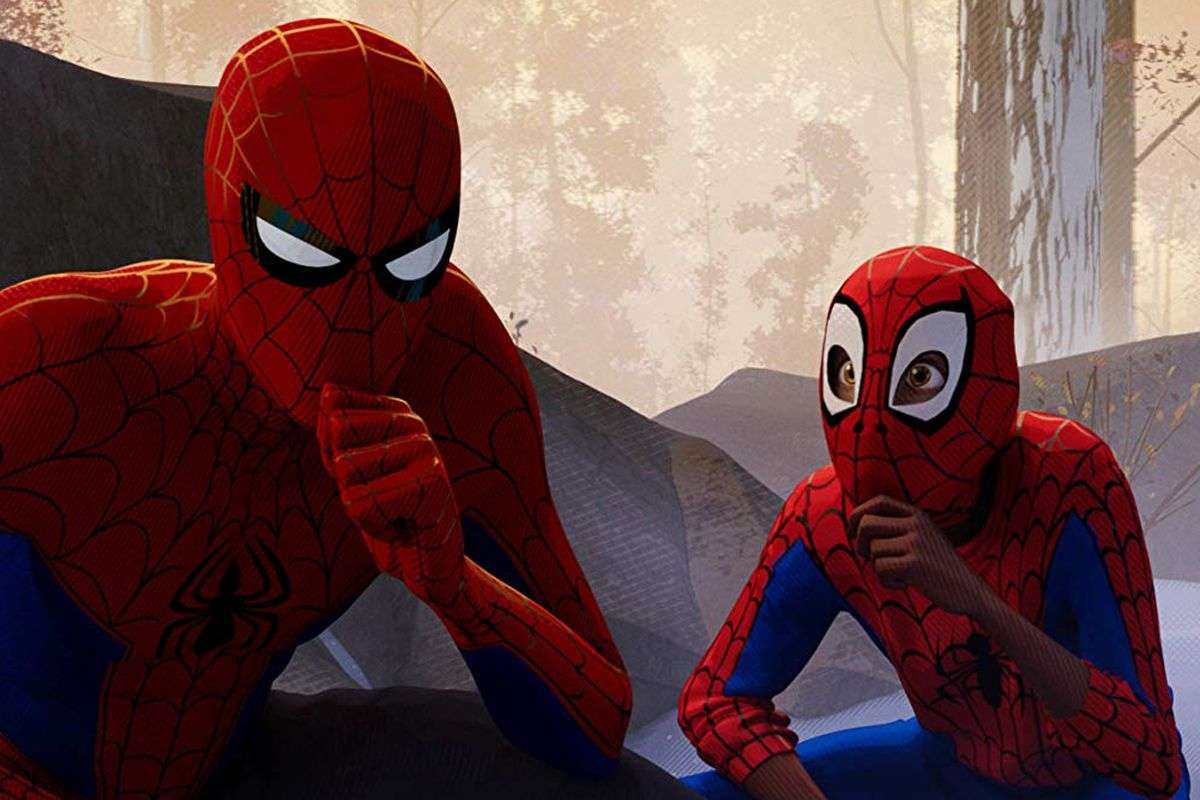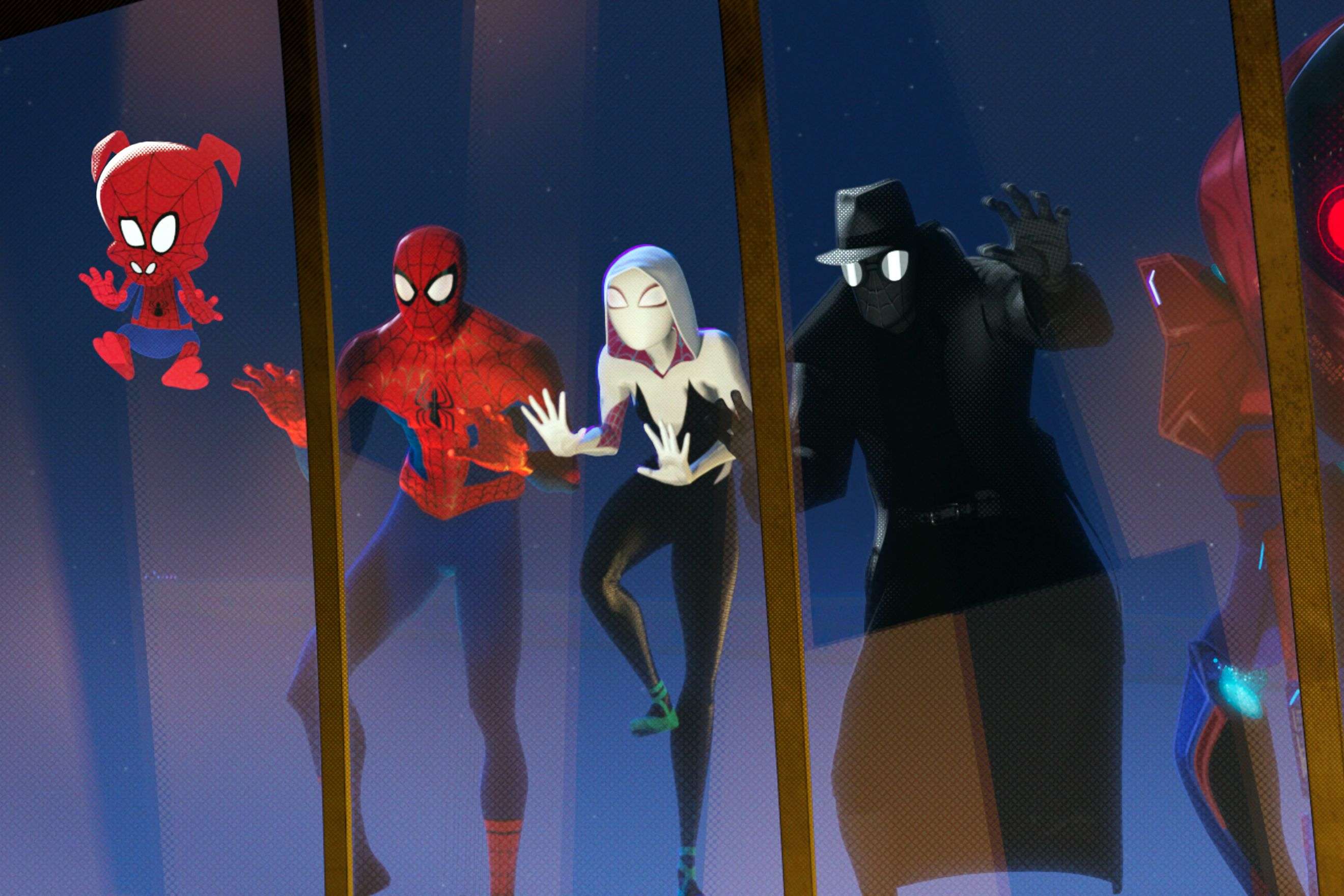Spider-Man: Into the Spider-Verse Is the Next Step in Superhero Movie Evolution
A joyous, energetic Spider-Man remix shows what superhero movies can be.

Earlier this year, I wondered whether superhero movies were stuck in a rut of cautious, formulaic competence. The new animated feature Spider-Man: Into the Spider-Verse makes a strong case that they aren't—or at least that they don't have to be.
For the last 20 years or so, superhero movies have focused on traditionalist takes on well-known characters, portraying them in their most widely known incarnations. But in the comics themselves, superhero identities tend to morph constantly: Multiple people have claimed the mantle of Captain America; for a while, Thor was a woman; and Peter Parker, the struggling newspaper photographer from Queens, hasn't been the only fictional New Yorker to wear a webbed spider-suit.
Superheroes aren't simply specific characters with fixed identities; they're ideas that can be recycled and remixed, taking on new forms and personas, changing with the times and with audience expectations. But despite their dominance at the box office, you wouldn't really know that from watching most superhero movies.
Into the Spider-Verse is the first big-screen feature to fully embrace the malleability of superhero identity. It revitalizes both the genre and the character, and it's an absolute delight.
Much of the film's success owes to its energetic, highly stylized animation. Most big-budget superhero movies are little more than computer-animated cartoons that pretend not to be. Yes, they have human actors and a smattering of physical props and sets, but they are filmed in front of green screens and built inside computers in an attempt to translate comic book sketch work into something that looks like it could exist in the real world.
Spider-Verse is largely computer-animated too, but it jettisons the live-action literalism that has sometimes held back other superhero films in favor of a jazzy, freewheeling hyperreality that in many ways does a better job of capturing the zany energy of hand-drawn comic books. It's a reminder that superheroes and the comics from which they originate are fundamentally cartoons, and live action is a constraint on what a superhero movie can be.

Spider-Verse follows Miles Morales, a half Puerto Rican, half African-American teenager from Brooklyn who takes on the identity of Spider-Man after the death of Peter Parker. As in the comics, Morales inhabits a parallel universe that largely resembles the main Marvel universe (and our own). This sci-fi conceit not only allows for a cleverly updated take on the character, it allows him to interact with a more traditionalist Spider-Man from yet another parallel universe—and eventually with a multiplicity of Spider-people, including Spider-Woman, Spider-Noir, and even Peter Porker, a cartoon pig who goes by Spider-Ham.
This may sound bizarre—and frankly at times it is. And yet it works, in part because of the zippy animation, and in part because it allows the movie to take the form of a conversation between multiple Spider-Persons about what the meaning of Spider-Man is.
The answer the movie gives is that Spider-Man isn't any one person but an ideal, a set of values, principles, and struggles that express themselves in varying ways for different people at different times, yet always resolve themselves in the same adage: With great power comes great responsibility. Being Spider-Man means choosing to accept that responsibility.
Last year, researchers published results from a study showing that young children worked more diligently at difficult tasks when dressed as Batman. You can certainly make far too much of gimmicky research like this, but the basic idea seems sound enough: Superheroes are simplified models for living, showing us what we can aspire to when we adopt their values and mindset. There's a similar idea at play in Spider-Verse, which is, at least in part, an argument that anyone can be—or at least be like—Spider-Man.
Under the ownership of Disney, Marvel has spent the last several years churning out competent, cautiously constructed blockbusters that play it safe all the way to global box-office dominance: Last weekend was the 13th this year that a movie based on a Marvel Comics property held the number one box office slot.
Meanwhile, attempts by Marvel's main competitor, DC Comics (which is owned by Warner Brothers), to copy Marvel's interconnected movie universe with films like Justice League and Batman v. Superman have been more miss than hit—although the success of Wonder Woman and reasonably positive early reviews for Aquaman suggest that quality levels may be improving somewhat.
Even still, a certain lack of ambition has come to define the format. Too many recent superhero movies have suffered from a kind of expectations-meeting blandness: They aim to be pretty good rather than great. Spider-Verse is a rare, and successful, exception. It's an ingenious animated triumph that shows how to expand the range of a well-known character like Spider-Man while offering an extended reminder why that character is so enduringly popular in the first place. It's the next step in superhero movie evolution.


Show Comments (13)